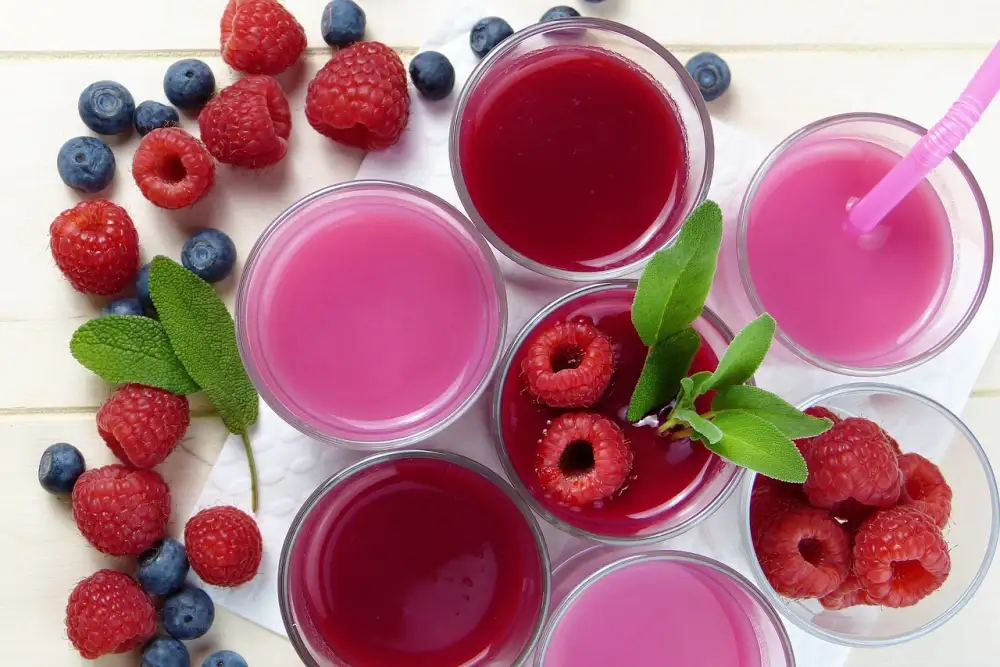Revitalize Your Health with the Ultimate Juice Diet: Discover the Power of Juices for a Vibrant Lifestyle

Are you looking to revitalize your health and embrace a vibrant lifestyle? Look no further than the ultimate juice diet. Juicing has gained immense popularity in recent years as a powerful tool for detoxification and rejuvenation. By extracting the natural goodness of fruits and vegetables, juices provide an abundance of essential nutrients in a convenient and delicious form. Whether you're seeking weight loss, increased energy levels, or simply a boost in overall well-being, the juice diet is your ticket to a healthier you. So, let's dive into the world of juicing and discover its incredible benefits for your health.
Benefits of Juice Diet for Health
The benefits of a juice diet for health are numerous. Firstly, juices are packed with essential vitamins, minerals, and antioxidants that help boost the immune system and protect against diseases. Secondly, juices are easily digestible, allowing the body to absorb nutrients more efficiently. Additionally, a juice diet can aid in weight loss as it is low in calories and high in fiber. Moreover, juices can improve digestion, promote healthy skin, and increase energy levels. Overall, incorporating a juice diet into your lifestyle can lead to improved overall health and well-being.
Types of Juices for a Juice Diet
When it comes to a juice diet, there are countless options to choose from. The key is to incorporate a variety of fruits and vegetables into your juices to ensure you're getting a wide range of nutrients. Some popular types of juices for a juice diet include:
1. Green Juices: These are made primarily with leafy greens like spinach, kale, and Swiss chard. They are rich in vitamins, minerals, and antioxidants that help detoxify the body and boost energy levels.
2. Citrus Juices: Orange, grapefruit, and lemon juices are packed with vitamin C and other immune-boosting nutrients. They also add a refreshing tanginess to your juice blends.
3. Berry Juices: Blueberries, strawberries, raspberries, and blackberries are not only delicious but also high in antioxidants that promote heart health and reduce inflammation.
4. Root Vegetable Juices: Carrots, beets, and sweet potatoes are great sources of vitamins A and C as well as fiber. These juices can aid digestion and improve skin health.
5. Tropical Fruit Juices: Pineapple, mango, papaya, and kiwi add a tropical twist to your juice diet while providing essential vitamins and enzymes for digestion.
Remember to experiment with different combinations of fruits and vegetables to find flavors that you enjoy. And don't forget to include some herbs like mint or basil for added freshness!
How to Start a Juice Diet
To start a juice diet, it's important to have a plan in place. First, decide on the duration of your juice cleanse. It can range from a few days to a couple of weeks, depending on your goals and health condition. Next, choose the right juicer that suits your needs. Cold-pressed juicers are recommended as they retain more nutrients. Stock up on fresh fruits and vegetables for juicing. Aim for a variety of colors to ensure a wide range of nutrients. Start by replacing one meal with a juice and gradually increase to two or three meals per day. Stay hydrated by drinking plenty of water throughout the day. Remember to listen to your body and adjust the duration and intensity of the cleanse accordingly.
Tips for a Successful Juice Diet
1. Start slowly: Gradually introduce juices into your diet by replacing one meal or snack with a juice. This will help your body adjust to the change.
2. Choose fresh, organic produce: Opt for fruits and vegetables that are pesticide-free and in season. This ensures maximum nutritional value and taste.
3. Mix it up: Experiment with different combinations of fruits and vegetables to keep your taste buds excited. Variety is key to prevent boredom.
4. Stay hydrated: Alongside your juice intake, remember to drink plenty of water throughout the day to stay hydrated and support detoxification.
5. Listen to your body: Pay attention to how you feel during the juice diet. If you experience any discomfort or unusual symptoms, consult a healthcare professional.
6. Plan ahead: Prepare your juices in advance and store them in airtight containers in the refrigerator. This saves time and ensures you have a juice readily available when hunger strikes.
7. Incorporate fiber: While juicing removes most of the fiber from fruits and vegetables, consider adding some back into your diet through supplements or by consuming whole foods like chia seeds or flaxseeds.
8. Be mindful of sugar content: Some fruits are naturally high in sugar, so be cautious about overconsumption as it can lead to blood sugar spikes. Balance sweet fruits with low-sugar options like leafy greens or cucumber.
9. Seek support: Join online communities or find a buddy who is also on a juice diet for motivation, recipe ideas, and moral support throughout your journey.
Remember, a successful juice diet is not just about weight loss but also about nourishing your body with essential nutrients for overall well-being.
Potential Risks and Precautions of a Juice Diet
While a juice diet can offer numerous health benefits, it is important to be aware of the potential risks and take necessary precautions. One of the main concerns with a juice diet is the lack of essential nutrients like protein and fiber. Since juices primarily consist of fruits and vegetables, they may not provide sufficient amounts of these nutrients. This can lead to deficiencies and imbalances in the body.
Another risk associated with a juice diet is the potential for blood sugar spikes. Juices are high in natural sugars, which can cause a rapid increase in blood sugar levels. This can be problematic for individuals with diabetes or those who are insulin resistant.
Furthermore, a juice diet may not be suitable for everyone, especially pregnant women, children, and individuals with certain medical conditions. It is crucial to consult with a healthcare professional before starting any new dietary regimen.
To minimize risks, it is recommended to incorporate variety into your juice diet by including different fruits and vegetables. This ensures that you receive a wide range of nutrients. Additionally, consider adding sources of protein such as nuts or seeds to your juices or consuming them separately.
It is also important to listen to your body during a juice diet. If you experience any adverse effects such as dizziness, fatigue, or digestive issues, it may be an indication that the diet is not suitable for you.
By being mindful of these potential risks and taking necessary precautions, you can safely enjoy the benefits of a juice diet while supporting your overall health and well-being.
Incorporating Exercise with a Juice Diet
While a juice diet can provide numerous health benefits, it is important to remember that exercise is an essential component of a healthy lifestyle. Incorporating regular physical activity into your routine can enhance the effectiveness of a juice diet and promote overall well-being.
Exercise helps to increase metabolism, burn calories, and build muscle tone. It also improves cardiovascular health, strengthens bones, and boosts mood. When combined with a juice diet, exercise can accelerate weight loss and improve body composition.
To get started, choose activities that you enjoy and that align with your fitness level. Whether it's jogging, swimming, cycling, or yoga, find something that motivates you to move your body. Aim for at least 30 minutes of moderate-intensity exercise most days of the week.
It's important to listen to your body while exercising on a juice diet. Be mindful of any signs of fatigue or dizziness and adjust the intensity or duration accordingly. Stay hydrated by drinking plenty of water before, during, and after your workout.
Remember to consult with your healthcare provider before starting any new exercise regimen. They can provide personalized recommendations based on your individual needs and health conditions.
By incorporating exercise into your juice diet journey, you will not only optimize the benefits of the juices but also enhance your overall fitness levels. So lace up those sneakers and get moving – revitalize your health through the powerful combination of juices and exercise!
Frequently Asked Questions about Juice Diet
1. Can I have solid food while on a juice diet?
It is recommended to consume only juices during a juice diet to maximize its benefits. However, if you feel the need for some solid food, opt for raw fruits or vegetables.
2. How long should I follow a juice diet?
The duration of a juice diet varies depending on individual goals and health conditions. It is advisable to consult a healthcare professional or nutritionist to determine the ideal length for your specific needs.
3. Will I lose weight on a juice diet?
A juice diet can aid in weight loss as it provides essential nutrients while reducing calorie intake. However, it is important to maintain a balanced approach and not solely rely on juicing for long-term weight management.
4. Can I drink store-bought juices instead of freshly made ones?
Freshly made juices are always preferred over store-bought options as they contain more nutrients and are free from preservatives. If store-bought juices are chosen, ensure they are 100% natural with no added sugars or artificial ingredients.
5. Can I exercise while on a juice diet?
Moderate exercise is generally safe during a juice diet, but listen to your body's signals and adjust accordingly. Avoid intense workouts and focus on gentle activities like walking or yoga to support your energy levels.
6. Is it safe to continue medications while on a juice diet?
If you are taking any medications, it is crucial to consult your healthcare provider before starting a juice diet. They can advise you on how to manage your medication schedule and potential interactions with certain juices.
Remember, every individual's health needs vary, so it's best to seek professional guidance before embarking on any dietary changes.
In conclusion, a juice diet can be an excellent way to revitalize your health and embrace a vibrant lifestyle. By incorporating fresh juices into your daily routine, you can enjoy numerous benefits such as increased energy levels, improved digestion, enhanced immune function, and weight management.
Remember to choose a variety of fruits and vegetables for your juices to ensure you receive a wide range of nutrients. Experiment with different combinations to find flavors that you enjoy. Starting a juice diet can be challenging at first, but with proper planning and preparation, it can become an enjoyable and sustainable part of your healthy lifestyle.
While there are potential risks associated with a juice diet, such as nutrient deficiencies or blood sugar imbalances, these can be mitigated by consulting with a healthcare professional and ensuring you consume enough protein and essential nutrients.
To maximize the benefits of a juice diet, consider incorporating regular exercise into your routine. Physical activity not only helps maintain overall health but also complements the detoxifying effects of the juice diet.
Before starting any new dietary regimen, it's important to consult with your doctor or nutritionist to ensure it aligns with your individual needs and goals. They can provide personalized guidance and help address any concerns or questions you may have.
By embracing a juice diet as part of your healthy lifestyle, you can nourish your body with essential vitamins and minerals while enjoying delicious flavors. So why wait? Start juicing today and embark on a journey towards optimal health!
Published: 14. 12. 2023
Category: Health



